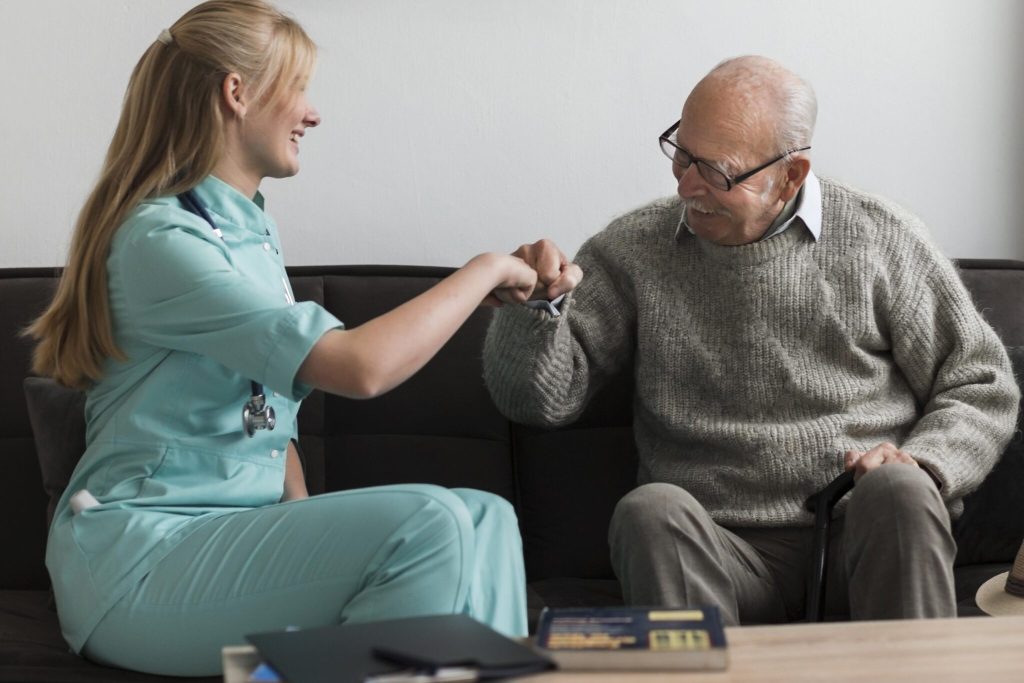When we find ourselves, or a loved one having to stay in hospital for a while, thoughts tend to revolve around our immediate care needs and the situation we find ourselves in. However, we must also give thought to how we are going to cope after being discharged and sent back home. Of course, being allowed home doesn’t mean that we are necessarily fully recovered. Hospital patients often need to take medication, have follow-up treatments and receive physio and other therapies to support their return to normal health. This is where a home care agency can step in and provide the required support.
- What happens when you come out of hospital
There should be a discharge plan, the details of which will differ depending on the hospital(s) involved. This will include details of the support the patient will require when they are back home. You can ask the medical staff what you or your loved one will need as part of this discharge plan. This can include medical interventions, such as giving oral medications, ointments or injections, dressing changes and having post-operation stitches checked and removed. You may also need help with domestic routines, personal care and grooming and other daily tasks. All of this, plus details of who will support you or your loved one, should be included in the discharge plan or pre-discharge discussions.
- How a home care agency can help
A home care agency is often best placed to provide post-discharge care as above. They will be very used to helping people who have just come out of hospital. Home carers can provide temporary or permanent post-discharge services, either as part of local council funding, or as a private arrangement with the person and their family. Once you have selected your home care agency, they will discuss your needs with you or your loved one to ensure a bespoke, person-led approach to your care. You should confirm task lists, timings and costs at this point too. The discussion should also cover arrangements for home agency carers to access your property if you are unable to answer the door to them yourself. If you or your loved one lives with others, home care agency staff can still provide essential services. These not only include practical help for the patient, but emotional support, respite and advice for the rest of the family.
- How to prepare practically for the hospital discharge
If the hospital does not provide transport home, you should arrange this as a matter of priority. You may or may not wish to have the home care agency visit ahead of the person’s arrival home, in order to do a quick tidy and ensure everything is in place (if the home care agency offers this type of service). The carer will gain a better idea of the type of equipment and supplies they will need (plus any instructions for use/details of dosages) to help you or your loved one best during the first few days at home. Make sure the home care agency has a copy of the discharge plan to help with this. If it is your loved one who is being discharged, arrange to be present when they get back home, to help them settle back in and offer some much-needed moral support.
- How to ensure a safe recovery at home
It goes without saying that you or your loved one must feel safe at home in order to start recovering properly. This is a fundamental human need that affects everything we feel, need and do. Likewise, the visiting home care agency carers must feel safe in the property too. Some practical steps could include having someone clean and tidy the home before the care arrangement starts. Make sure the carers have enough space to prepare meals and clean up afterwards, get medication ready and set up any equipment required for therapy or personal care. Inform them, too, of any mental health or cognitive issues present that could affect how they interact with you or your loved one during their visit.
Ensure that communications are working well, and that both parties understand what is going to happen, and what they can expect from each other to make the arrangement work safely and effectively. If you are recovering after a fall, accident or surgery, it is vital that you do not try to do too much too soon. This could result in a further accident or post-operative damage that could slow down or even prevent continued recovery.




